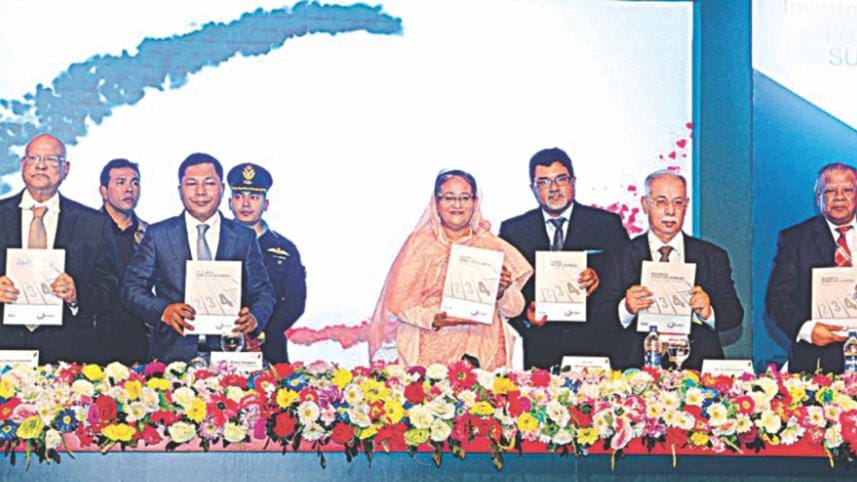Reduce cost of doing business for faster growth

Bangladesh is proving to be unstoppable in achieving success in almost all the sectors of development at the moment. Even the harshest of its critics are taking a back seat now to watch in awe the multi-faceted works going on round the clock that are resulting in increased production in the industries, agricultural farms, fisheries, garment industries and many other non-formal sectors. Hard work of the people engaged in businesses facilitated by supportive government policy is the main factor behind the phenomenal acceleration. The private sector of the country deserves all the praise for making this possible in a resource-constrained country like Bangladesh.
Great news for the private sector! Prime Minister Sheikh Hasina inaugurated the two-day Bangladesh Investment and Policy Summit 2016 on 24th January, to showcase investment opportunity for private entrepreneurs. A deputation of foreign investors including experts of foreign direct investment and industrial and international trade, policymakers and business entrepreneurs joined the Investment Summit. The Board of Investment (BOI) had earlier announced that the main objective of the summit was to highlight the latest policy guidelines for the private sector growth and private sector investment opportunities in Bangladesh that would lead to country's sustained economic growth.
To say the least, the Investment Summit was a timely initiative to provide the business sector with the required boost to take the economy a few notches up, especially because the flow of foreign direct investment (FDI) has not been as steady as we had wanted in the past years. In a recent statement, American Chamber of Commerce in Bangladesh (AMCHAM) said that the government and the private sector should look into the reasons behind the weak flow of FDI into the country. It raised the question whether or not our legal framework is really pro-FDI and whether government policy and legal provisions need to be updated.

Bangladesh is striving hard to reach the milestone of middle-income status within the shortest possible time. But to reach that target, some obstacles that continue to thwart smooth navigation need to be addressed without further loss of time. The country needs foreign investment in terms of money and technology transfer, which can be possible only if we make the journey of the investors as hassle-free as possible in setting up industries and running their business.
In this regard, some stringent regulatory terms and conditions need to be looked into, as such rules and regulations are often frustrating possible investors.
There are allegations that some investors have gone back to their country after finding the long waits and hassles of surmounting many obstacles a bit too much. In the World Bank report “Doing Business 2016: Measuring Regulatory Quality and Efficiency”, Bangladesh dropped two positions to 174 in the ranking of ease of doing business due to stalled regulatory reforms. Only Afghanistan (177) comes after Bangladesh amongst South Asian countries.
The report shows that many other South Asian countries did much better, for example, Bhutan (71) topped the rankings in South Asia, followed by Nepal (99), Sri Lanka (107), Maldives (128) and India (13). Even Myanmar (167) and Mauritania (168), which were below Bangladesh in the index last year, have moved ahead of Bangladesh now.
The lead economist at the World Bank Dhaka office, Zahid Hussain, perhaps rightly said, “This is a wake-up call for us to inject a new lease of life in regulatory reforms in order to increase the attractiveness of Bangladesh as a prolific investment destination vis-à-vis our international competitors.”
While such findings are not good for Bangladesh, instead of fretting and pointing fingers at others let us look within and find what we are not doing right. World Bank's ranking method must have some basis and we have to pick up from where it ended. Basically, the business community of the country has been asking for a more enabling environment, which can be ensured through political and macro-economic stability; sound policy and regulatory framework supported by relevant institutions; enforcement of laws and regulations; and building of adequate infrastructure.
They have made several suggestions, including the introduction of a 'Green Channel' or one-stop clearance point so that businessmen can quickly complete formalities, and a reduction of the number of documents required by the customs authority. They have recommended a taskforce be formed headed by NBR with delegates representing FBCCI, MCCI, CCCI, customs and port authorities, Health Ministry, BOI, Immigration Department, Environment Ministry, Bangladesh Bank, and the exporters and importers themselves, to help take quick decisions and thus reduce the cost of delays. They want reform of the taxation system, as many tax provisions are not clearly written and can be wrongly interpreted by the tax officials, creating scope for corruption. They believe that the present taxation system provides many loopholes to evade taxes. To face the problem, a tax ombudsman can be given the task to represent taxpayers in the administration and investigate taxpayer complaints.
The business community further observed that although the Board of Investment (BOI) is supposed to be the focal point of the investment process as well as the single point of delivery for all services to investors, it does not meet the satisfaction of investors. BOI is not provided with sufficient power to function with clout, as it cannot overcome the powerful bureaucratic hierarchy. The business community wants industrial parks throughout the country, either under the authority of BOI or that of the private sector with full backing and support of BOI.
There is further good news for the business community of the country. The Bangladesh Investment Development Authority (BIDA) will start functioning in a couple of months to attract foreign and local private sector investment in the country. The new powerful body is being created by merging two government offices—the Board of Investment and the Privatisation Commission. BIDA is expected to bring vitality back into the work, as it has the power to overcome bureaucratic bottlenecks in implementing investment-related government decisions. This is predicted to be the much-awaited one-stop service centre to expedite the work of the investors.

Entrepreneurs will also get opportunity to start their industrial units, as 10 more economic zones will soon be opened across the country. Bangladesh Economic Zones Authority (BEZA) has plans to subsequently build 100 more zones over the next 15 years.
But, the pertinent question is, will the cost of setting up and doing business in Bangladesh decrease substantially after all these projects begin operation? Will the unnecessary obstacles be removed once and for all so that foreign investors may find a safe haven in Bangladesh to invest money and take back their share of the profit? Unless and until the attitude of the staff members become friendly and stipulated government rules and regulations are simplified, FDI growth will remain dismal.
The bottom line is that we have to reduce the cost of doing business in Bangladesh if we want to reach the middle-income country status any time soon.
The writer is Special Supplement Editor, The Daily Star.




 For all latest news, follow The Daily Star's Google News channel.
For all latest news, follow The Daily Star's Google News channel.
Comments